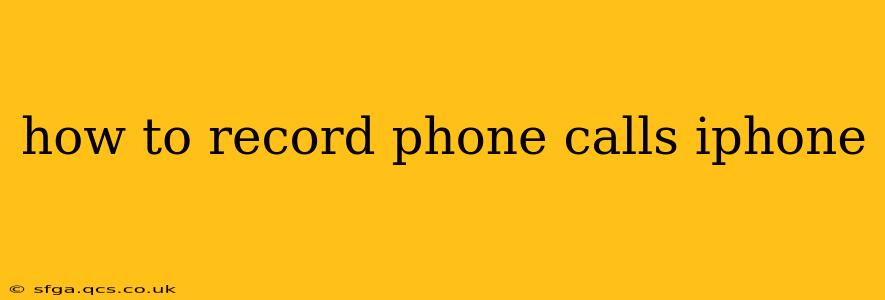Recording phone calls can be incredibly useful for various reasons, from documenting important business conversations to preserving personal memories. However, recording calls on an iPhone isn't as straightforward as on some Android devices. This comprehensive guide will explore the different methods and considerations involved in recording phone calls on your iPhone.
Important Legal Considerations: Before we delve into the how-to, it's crucial to understand the legal implications of recording phone calls. Laws vary significantly by location. In many places, all parties involved must consent to the recording. Failing to obtain consent could lead to legal repercussions. Always be aware of and abide by the laws in your jurisdiction.
Methods for Recording Phone Calls on iPhone
Unfortunately, there's no built-in call recording feature on iPhones. This means you'll need to rely on third-party apps or other workarounds. Here are the primary options:
1. Using Third-Party Call Recording Apps
Several apps on the App Store offer call recording functionality. However, these apps operate with limitations and often require both parties' consent. They typically work by using a three-way call or merging the audio streams. The quality may vary depending on the app and network conditions. Remember to always check the app's privacy policy and ensure it complies with relevant laws.
Important Note: Apple's App Store policies strictly regulate call recording apps. Therefore, finding reliable and consistently functional apps can be challenging. Some apps might be removed from the App Store at any time, and their functionality might change.
2. Using Voice Memos (for Speakerphone Calls)
This method isn't ideal for private conversations, but it works for recording calls where both parties are comfortable with the speakerphone being on. Simply place the call on speakerphone and use the iPhone's built-in Voice Memos app to record the conversation. The audio quality will depend on the microphone's proximity to the speakerphone.
Limitations: This is a less-than-ideal solution because it won't capture both sides of the conversation with equal clarity. It also requires explicit consent from all parties involved.
3. Using a Third-Party Call Recorder (External Hardware)
For the highest quality recordings and a more reliable solution, consider using an external call recorder. These devices connect to your iPhone via a wired or wireless connection and capture both sides of the conversation independently. Many are designed for professionals and offer superior audio quality compared to app-based solutions.
Pros: Higher audio quality, greater reliability, often easier to use. Cons: Additional cost, requires external hardware.
Frequently Asked Questions (FAQs)
Here are some common questions people ask about recording phone calls on iPhones:
Is there a built-in call recorder on iPhone?
No, Apple does not provide a built-in call recording feature on iPhones.
Can I record a phone call without the other person knowing?
This is generally illegal in most jurisdictions. It is crucial to always obtain consent from all parties involved before recording a phone call. Doing so without consent can have serious legal consequences.
What are the best apps for recording phone calls on iPhone?
The availability and functionality of call recording apps on the App Store can change frequently. It is best to conduct your own research to find an app that meets your needs and complies with your region's laws. Always read reviews and check the app's privacy policy.
How can I improve the audio quality of my recorded phone calls?
For better audio quality, use an external call recorder, ensure a stable network connection (for app-based solutions), and minimize background noise. Using a headset microphone might also help.
Conclusion
Recording phone calls on iPhone requires careful consideration of legal implications and practical limitations. While a built-in solution isn't available, several workarounds exist, each with its own advantages and disadvantages. Choosing the right method depends on your specific needs, technical capabilities, and awareness of the laws in your region. Always prioritize legal compliance and obtain consent from all parties involved before recording a phone call.
